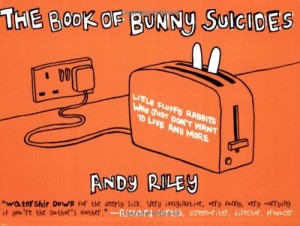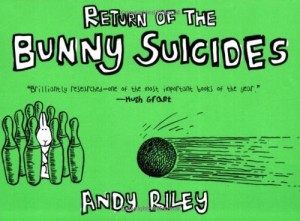Looking at the list of “most popular” links on Del.icio.us, it seems someone has scanned the entire Book of Bunny Suicides and its sequel, both by Andy Riley.
Good grief, people—you can pick up the book for $7.00 at any bookstore. I can understand posting a couple of excerpts, but from what I can tell, these people have scanned and posted the entire book. They haven’t even credited the source! In the blog postings that show up on a “bunny suicides” search, most of them don’t even seem to know where the cartoons are from. Heck, even with pirated MP3s you usually know who sang the song.
Google has pulled a few of the sites from their index in response to a DMCA complaint. (Interestingly, Google themselves linked to the Chilling Effects entry.)
It always amazes me how rude people can be.

